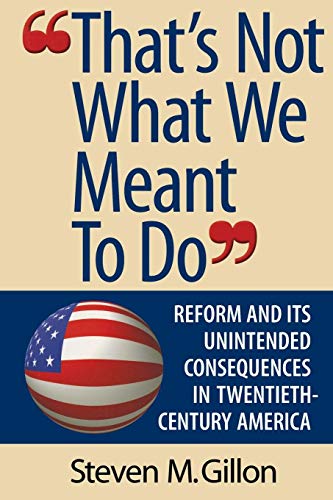- Features
- Description
- Similar Items
Binding:
PaperbackBrand:
Brand: WW Norton CoEAN:
9780393978667Label:
W. W. Norton & CompanyManufacturer:
W. W. Norton & CompanyModel:
Size:
Warranty:
Historian Steven M. Gillon, host of the History Channel's HistoryCenter program, examines how the law of unintended consequences has left its mark on the politics of welfare, mental health, affirmative action, immigration, and campaign finance. On immigration, for example, Gillon describes how a 1965 law to revise admissions procedures wound up opening the floodgates. Senator Ted Kennedy promised the law "will not inundate America with immigrants from any one country or area, or the most overpopulated and economically deprived nations of Africa and Asia." Yet that's pretty close to what actually happened. The huge numbers of immigrants entering the United States today--close to a million legal newcomers annually, and most of them from Asia or Latin America--are a direct result of this reform. And there are many other such examples of good intentions gone awry. As he writes in his introduction, "Congress frequently passes bills that it does not fully understand, that cannot be enforced with any precision, and that are full of loopholes begging for court challenges and conflicting interpretations."
As Gillon points out, conservatives often argue against government programs by citing the law of unintended consequences, though he believes this approach to be somewhat limiting: "At the heart of the problem of unintended consequences in the United States is a paradox: Americans look to Washington for solutions to complex problems, but they are reluctant to give government the power it needs to address most issues." Later, he adds, "I would not want readers to conclude from these examples that we must abandon our efforts to identify social problems or suspend efforts to use government as a positive force for social change." It's not clear all readers will come away from That's Not What We Meant to Do in agreement--some may begin to think a "do-nothing Congress" might be a good thing--but they'll certainly learn to expect the unexpected. Consider this a public-policy version of Edward Tenner's book Why Things Bite Back. It should be required reading on Capitol Hill. --John J. Miller






